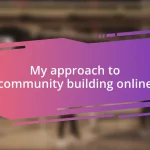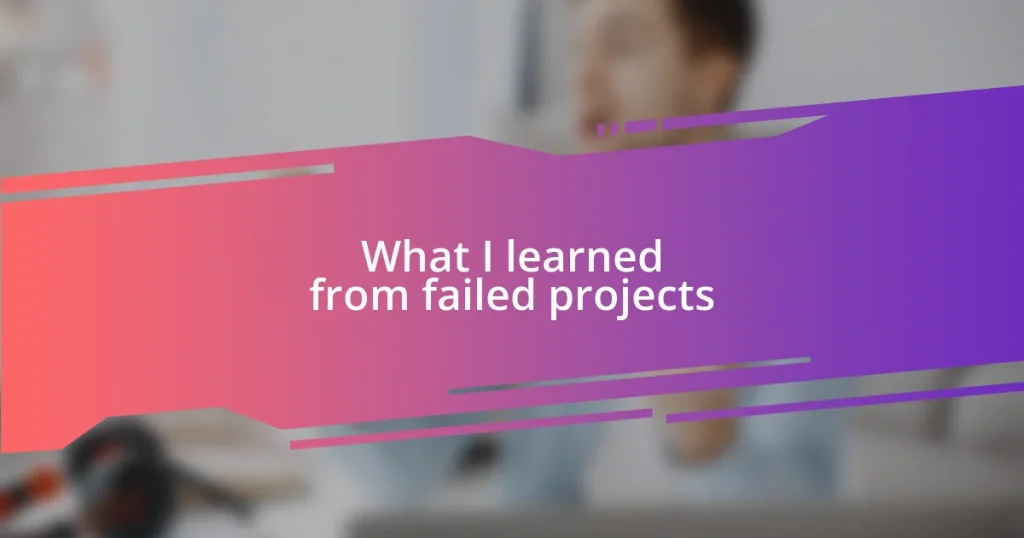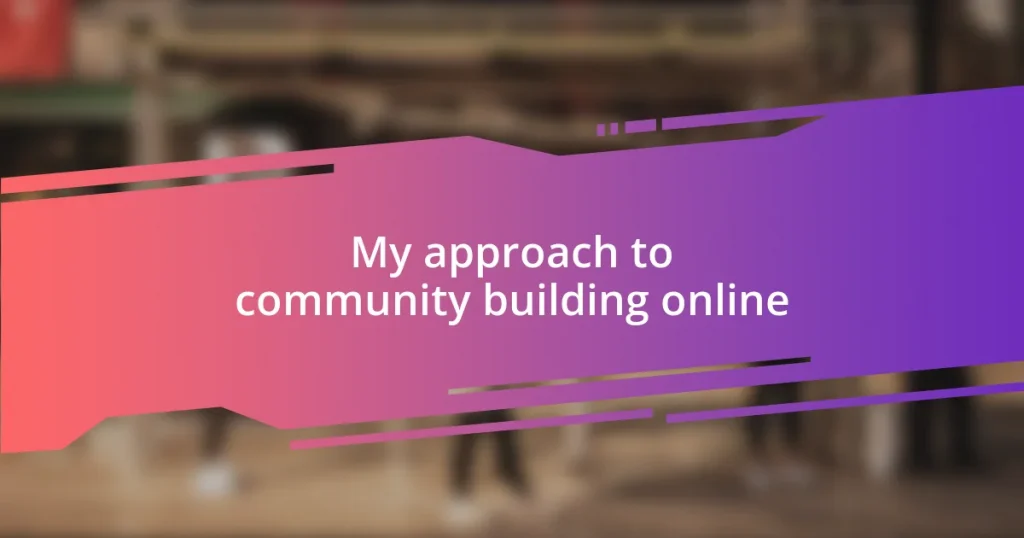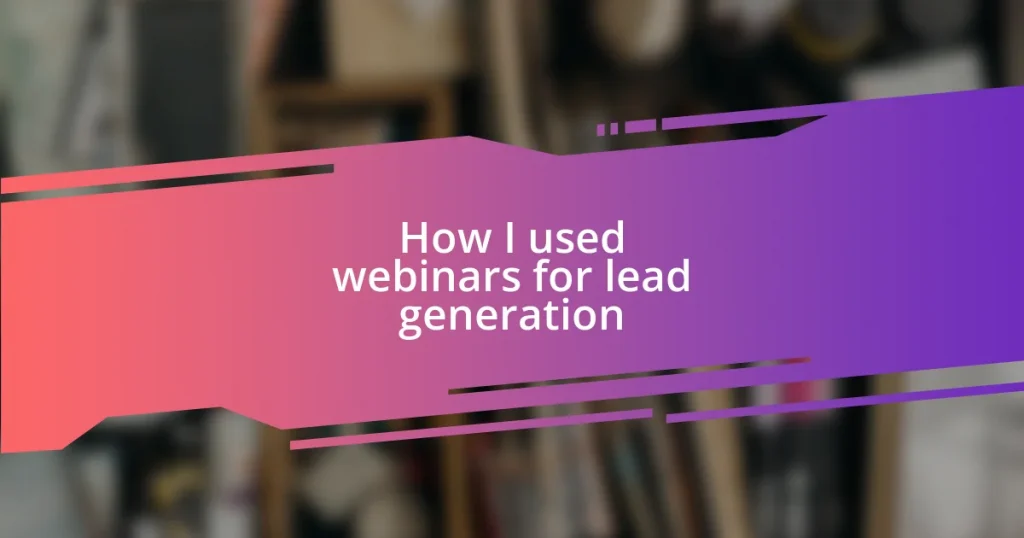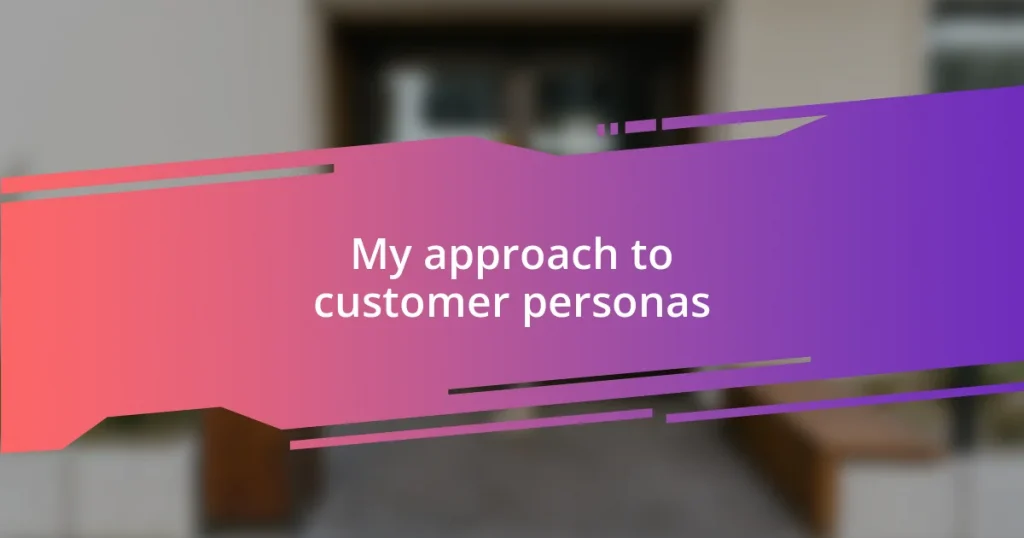Key takeaways:
- Thorough planning and clear objectives are vital to avoid chaotic project outcomes, while open communication enhances team collaboration.
- Embracing failure fosters personal and professional growth, highlighting the importance of self-discovery, adaptability, and innovative thinking.
- Reflecting on past mistakes and maintaining a culture of continuous improvement are essential strategies for successful future projects.
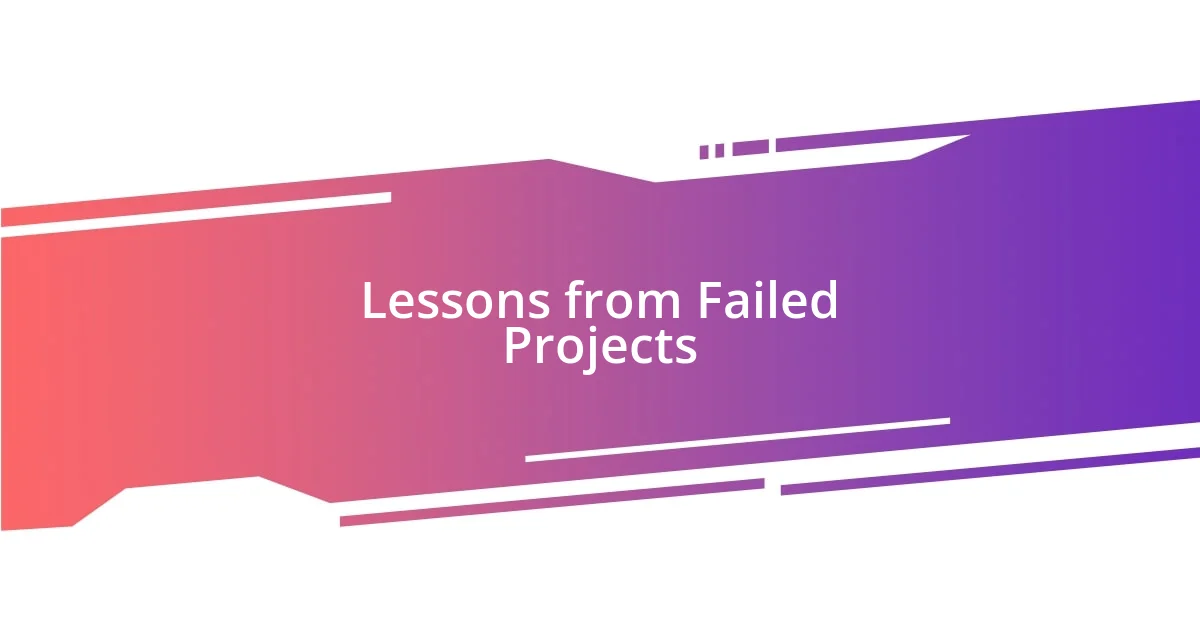
Lessons from Failed Projects
One of the most eye-opening lessons I learned from my own failed projects is the importance of thorough planning and clear objectives. I once jumped into a project without fully defining what success looked like, and it quickly became a chaotic mess. Have you ever found yourself in a similar situation, where a lack of focus derailed your progress?
Another critical insight I’ve gained is the value of open communication within a team. In a particular project, we kept our struggles hidden, thinking we could resolve them on our own. It wasn’t until we reached a breaking point that I realized the power of sharing challenges early on. How often do we underestimate the strength of collaboration, especially when things get tough?
Finally, failure taught me resilience and the need to embrace a growth mindset. After a project I poured my heart into fell flat, I felt disheartened. Yet, with time, I recognized that each setback is an opportunity for growth. How can we shift our perspective on failure to see it as a stepping stone rather than a setback?
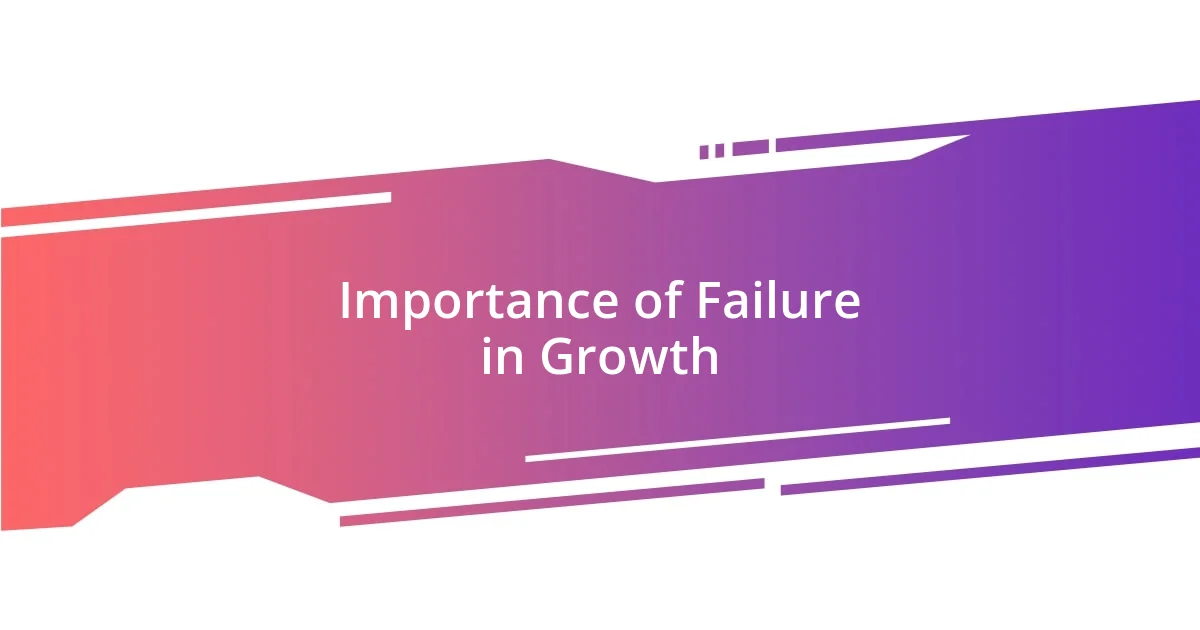
Importance of Failure in Growth
Embracing failure is crucial for personal and professional growth. I remember a project that completely fell apart because I ignored feedback from my colleagues. Their insights could have steered us clear of the pitfalls I underestimated. Failure isn’t just a signal that something went wrong; it’s also a powerful teacher that encourages self-reflection and adaptation. When we allow ourselves to learn from these experiences, we cultivate a mindset that embraces challenges.
Here are some key points to consider about the importance of failure in growth:
- Self-Discovery: Failures reveal our strengths and weaknesses, allowing us to understand ourselves better.
- Adaptability: Each setback teaches us how to adjust our strategies and approaches for future endeavors.
- Confidence Building: Overcoming failures builds resilience and confidence, empowering us to take on bigger challenges.
- Collaboration: Failure often prompts better communication within teams, emphasizing the importance of shared experiences.
- Innovative Thinking: Mistakes can spark creativity, leading us to explore innovative solutions we might not have considered otherwise.
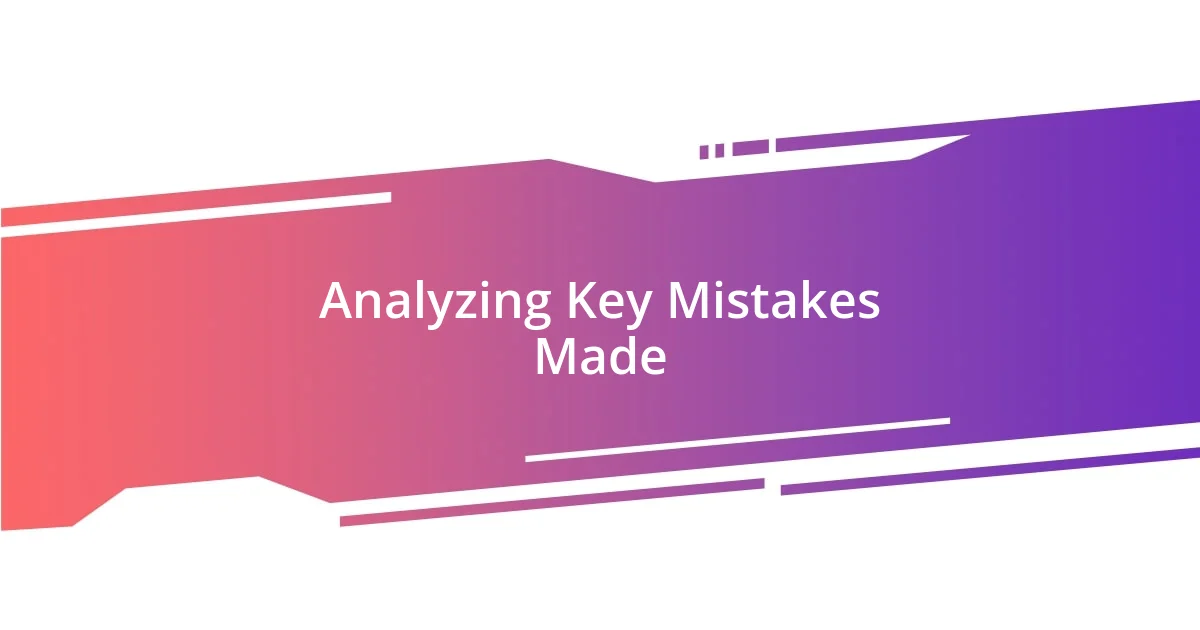
Analyzing Key Mistakes Made
Analyzing past projects reveals a pattern of common mistakes that are often overlooked. For instance, I’ve noticed how frequently we ignore the importance of setting realistic timelines. In one particular project, I confidently set an ambitious deadline without accounting for potential roadblocks. The end result? A rushed completion that compromised quality. Have you ever rushed through something only to regret it later? It’s a tough lesson, but one that reinforces the value of pacing ourselves.
Another mistake I’ve encountered is inadequate resource allocation. In my early projects, I often assumed that everyone could just “chip in” as needed. However, I learned the hard way that lack of clear roles led to confusion and burnout. A well-defined structure helps ensure that everyone knows what they’re responsible for, which streamlines the process immensely. Have you ever felt lost in a project because roles weren’t clear? It’s incredibly stressful, but with experience, I’ve come to appreciate the clarity that comes with delegation.
Ultimately, reflecting on these mistakes serves as a reminder that growth comes from understanding where we went wrong. By analyzing our missteps, we not only become better at planning but also deepen our emotional resilience. It’s about transforming those painful moments into opportunities for improvement, paving the way for future success.
| Key Mistakes | Impact |
|---|---|
| Setting unrealistic timelines | Compromised quality and heightened stress |
| Poor resource allocation | Increased confusion and potential burnout |
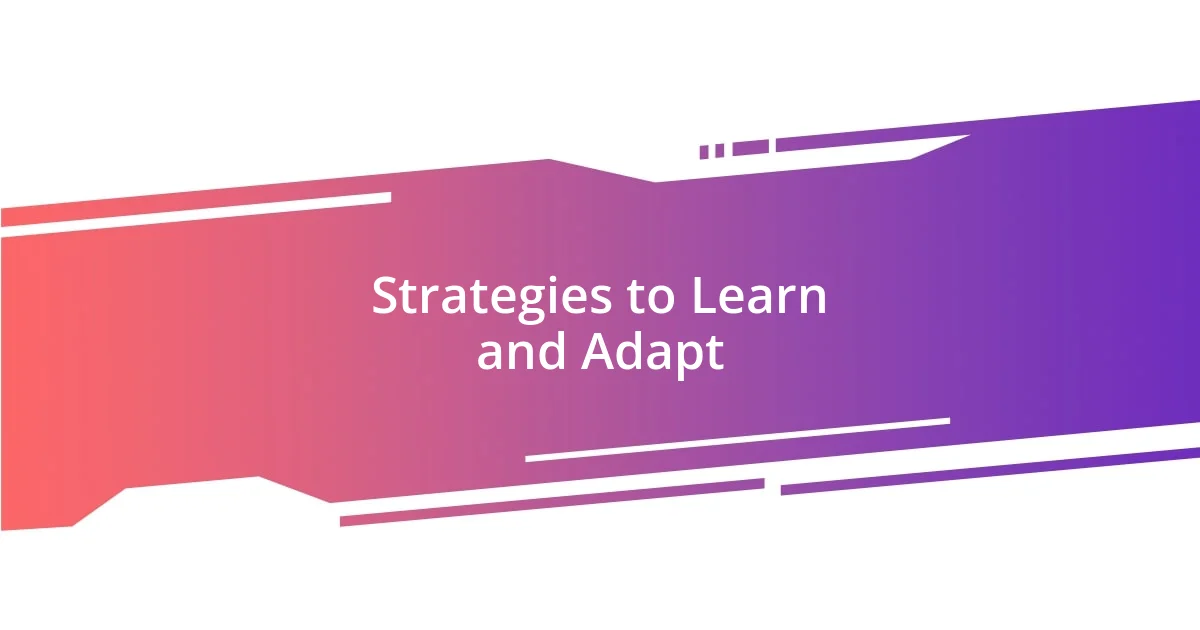
Strategies to Learn and Adapt
I’ve learned that one of the most effective strategies for learning and adapting is to create a structured debrief after a project, especially when things don’t go as planned. In one instance, I gathered the team post-failure and we laid everything out on the table: what went right, what went wrong, and most importantly, why. That open dialogue not only brought to light aspects I hadn’t even considered but also fostered a sense of trust and camaraderie amongst my colleagues. Have you ever had that moment when a group reflection led to a clear path forward? It’s a powerful experience that can catalyze growth.
Another strategy I’ve adopted is embracing a mindset of experimentation, which allows for small-scale trials before launching into larger initiatives. For example, during a failed marketing campaign, we decided to test different messages with smaller audiences. This approach not only reduced risk but also provided us with invaluable feedback that shaped our final strategy. It makes me think—how often do we rush straight into full implementation, only to face setbacks? By starting small, we create a safety net that allows for learning without the fear of significant failure.
Lastly, I can’t emphasize enough the significance of documenting lessons learned. I’ve kept a personal journal where I jot down key takeaways from each project, both successful and unsuccessful. This helped me crystallize my thoughts and refer back to them in the future. It’s almost like having a mentor in your pocket! How often do we forget the lessons of yesterday amidst the rush of today? Capturing these insights not only aids in personal development but also serves as a resource for teams to reference as we navigate future challenges together.
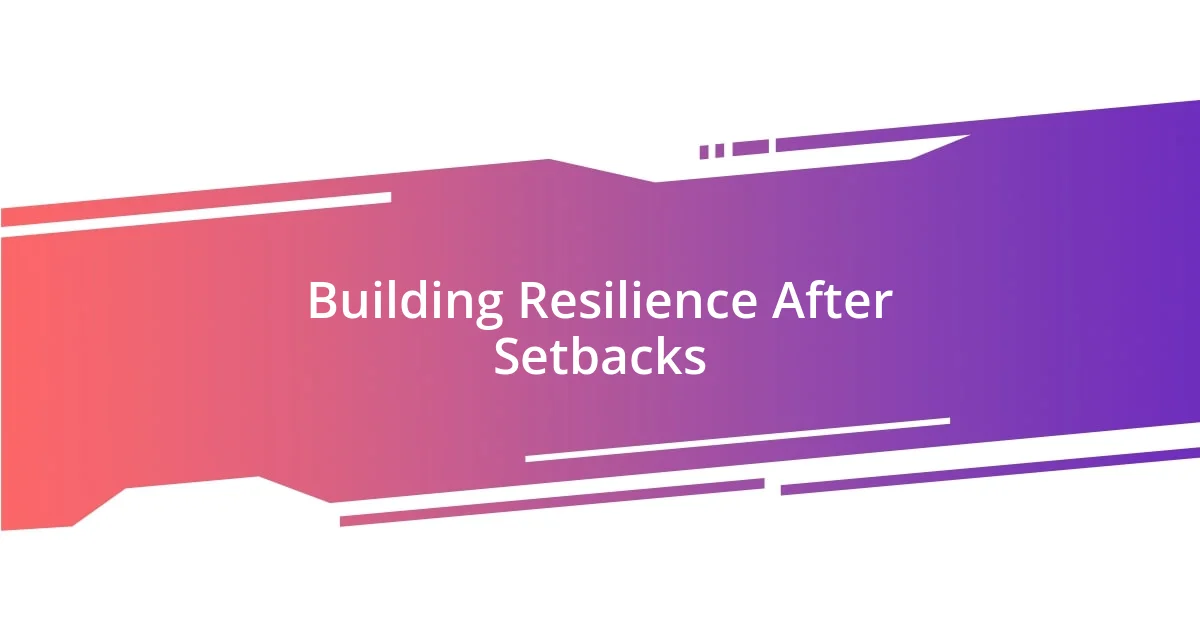
Building Resilience After Setbacks
When faced with setbacks, resilience can be like a muscle that needs to be strengthened over time. I remember a project where we faced a major financial shortfall mid-way through. Initially, it felt crushing, but I decided to gather the team for a brainstorming session. We didn’t just focus on the loss; instead, we explored innovative ways to pivot. How often do we let a setback define our path? It’s empowering to realize that challenging moments can lead to unexpected opportunities if we shift our perspective.
Building resilience also means learning to manage our emotions after a setback. I once poured my heart into a project that ultimately failed. It stung, and for a moment, I felt overwhelmed with doubt. But instead of wallowing, I reached out to a mentor who reminded me that failure is not a personal indictment; it’s part of the journey. Have you ever felt the weight of disappointment? It’s important to lean into those feelings, reflect on them, and use them as fuel for your next endeavor.
Lastly, fostering resilience requires a community of support. After a particularly tough project, I found comfort in sharing my experience with others who had faced similar challenges. Their stories reminded me that we’re not alone in our struggles. Have you ever shared your failure with someone only to find solidarity? It creates a sense of belonging and encouragement to keep pushing forward, turning setbacks into stepping stones for growth.
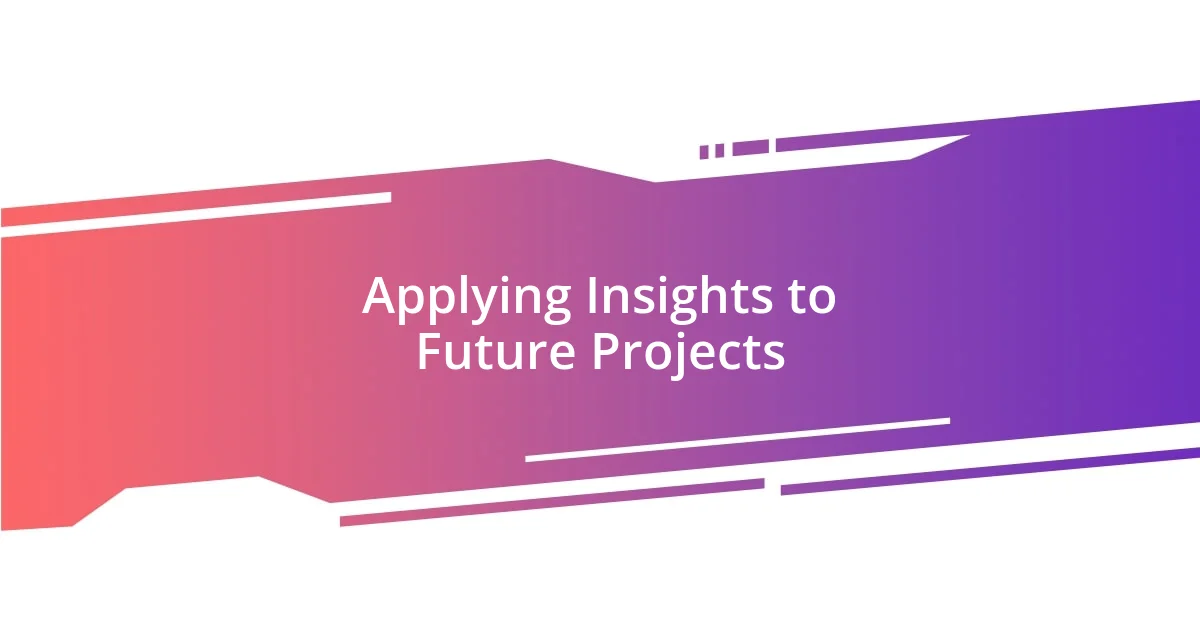
Applying Insights to Future Projects
After reflecting on past projects, I’ve found that maintaining an adaptable project plan is crucial. Last year, I tackled a project that initially seemed straightforward but quickly became complicated due to unexpected regulatory changes. Instead of sticking rigidly to our initial timeline, I encouraged the team to reassess our priorities and make real-time adjustments. This flexibility not only alleviated stress but also allowed us to continue moving forward, learning on the fly. Have you ever noticed how a little adaptability can sometimes be the difference between success and disaster?
Another insight I’ve applied is the importance of leveraging feedback loops. In my early career, I often hesitated to ask for feedback, fearing criticism. However, after a challenging project, I started actively seeking input from my team during each phase. One day, I approached a project wracked with miscommunication; by gathering insights throughout, we could identify issues before they escalated. It was eye-opening to see how much clearer our direction became when everyone felt empowered to speak up. How often do we overlook the value of our colleagues’ insights?
Lastly, I’ve learned to embrace a culture of continuous improvement. In a recent project, post-failure, we instituted team workshops to brainstorm better solutions. I vividly recall the energy in the room as everyone contributed ideas, fostering a collaborative environment. This not only reignited our motivation but also surfaced innovative strategies that we could implement moving forward. Have you considered how collective creativity and problem-solving might reshape your future projects? Embracing that mindset transforms each setback into a stepping stone rather than a stumbling block.
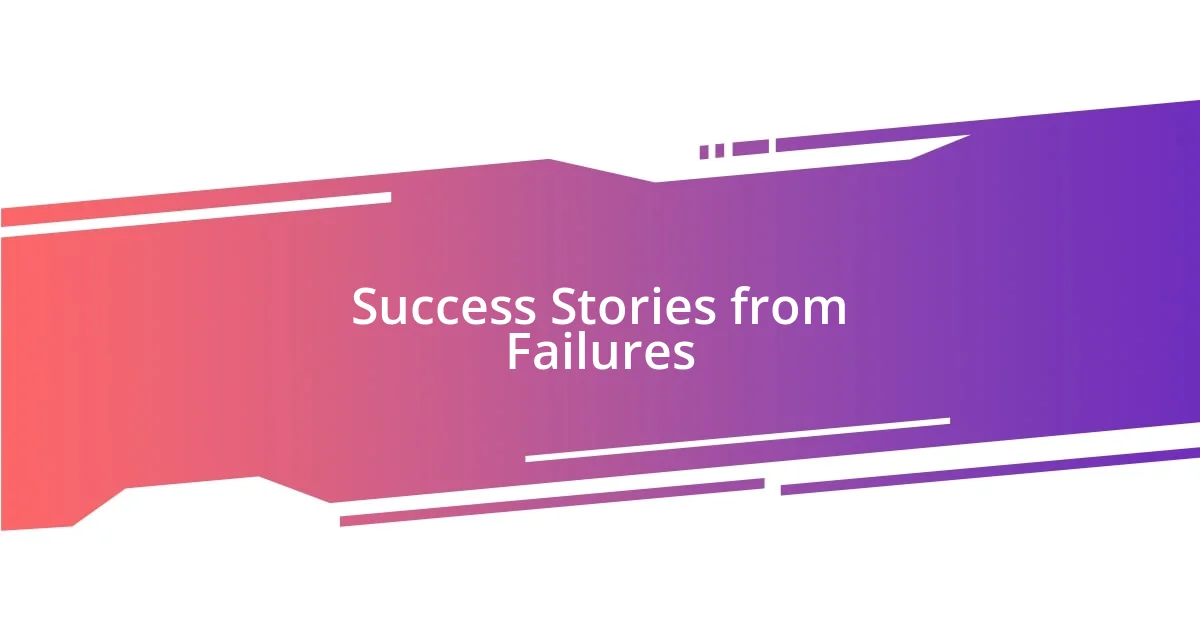
Success Stories from Failures
I distinctly recall a launch that went awry, leaving my team and me grappling with disappointment. Instead of resigning ourselves to the outcome, we took a hard look at what went wrong. That brutal honesty led us to an unexpected revelation: our original audience was misidentified. This insight became the bedrock for our next project. Have you ever turned a critical misstep into your next target market?
After a particularly challenging product rollout, I was surprised to see how we turned our embarrassment into celebratory creativity. We hosted a team retrospective not to point fingers but to share laughter and lessons. This approach not only defused the tension in the room but also sparked a wave of innovative ideas that reshaped our subsequent campaigns. Isn’t it refreshing to transform failure into a creative catalyst?
What truly stands out to me are the relationships forged in the aftermath of failure. I remember connecting with a colleague over a project that had me questioning my abilities. By sharing our experiences, we uncovered strategies that neither of us would have considered alone. This camaraderie not only healed some wounds but also enhanced our collaboration in upcoming projects. When was the last time you found strength in shared adversity?
